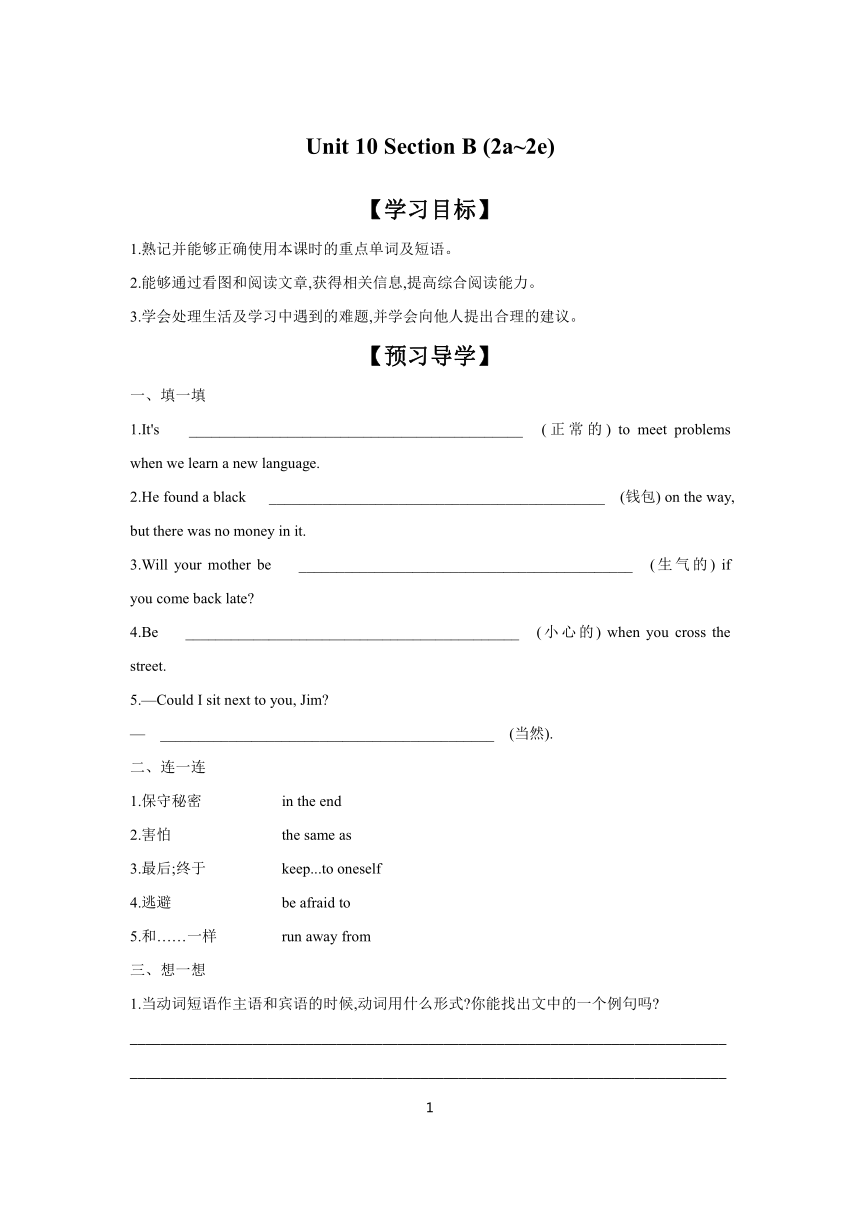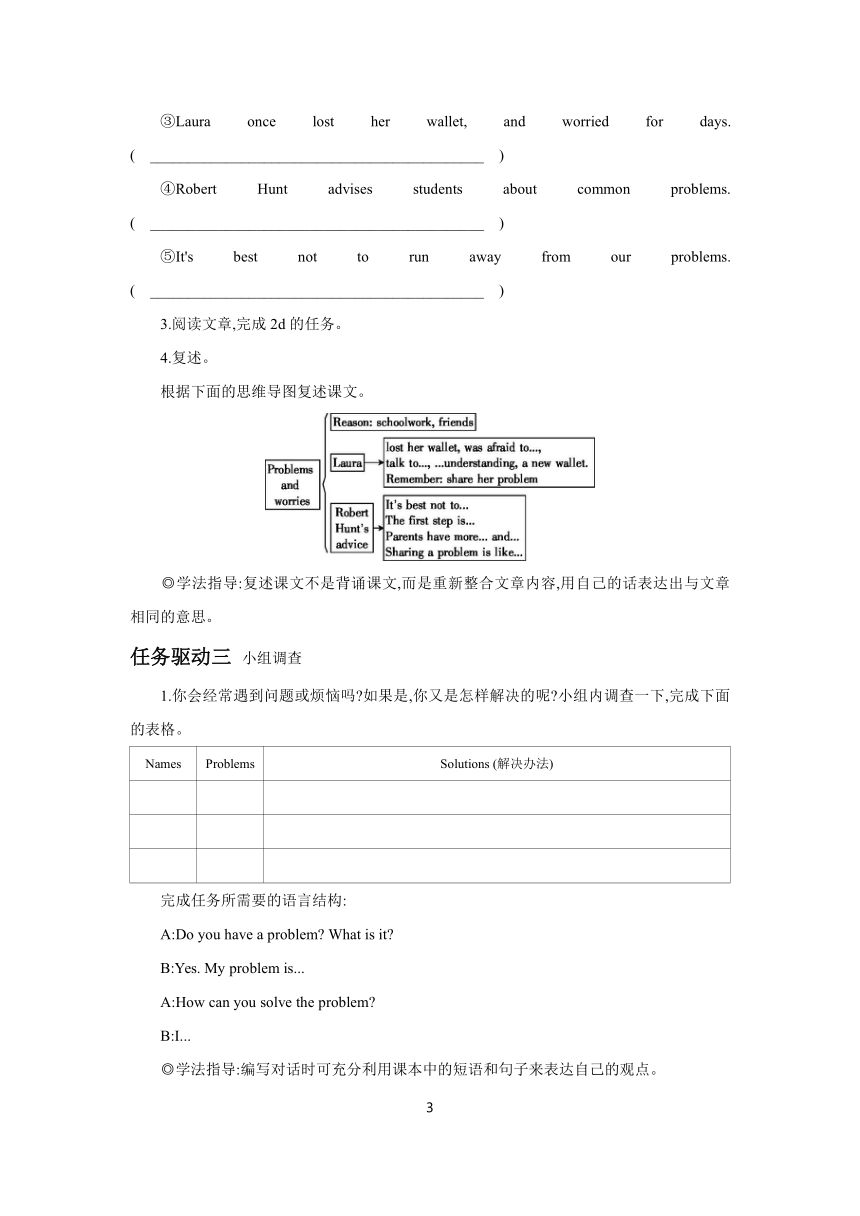Unit 10 If you go to the party, you'll have a great time!Section B (2a-2e) 学案 2023-2024学年教版八年级上册
文档属性
| 名称 | Unit 10 If you go to the party, you'll have a great time!Section B (2a-2e) 学案 2023-2024学年教版八年级上册 |

|
|
| 格式 | docx | ||
| 文件大小 | 90.6KB | ||
| 资源类型 | 教案 | ||
| 版本资源 | 人教新目标(Go for it)版 | ||
| 科目 | 英语 | ||
| 更新时间 | 2024-02-22 00:00:00 | ||
图片预览



文档简介
Unit 10 Section B (2a~2e)
【学习目标】
1.熟记并能够正确使用本课时的重点单词及短语。
2.能够通过看图和阅读文章,获得相关信息,提高综合阅读能力。
3.学会处理生活及学习中遇到的难题,并学会向他人提出合理的建议。
【预习导学】
一、填一填
1.It's ____________________________________________ (正常的) to meet problems when we learn a new language.
2.He found a black ____________________________________________ (钱包) on the way, but there was no money in it.
3.Will your mother be ____________________________________________ (生气的) if you come back late
4.Be ____________________________________________ (小心的) when you cross the street.
5.—Could I sit next to you, Jim
— ____________________________________________ (当然).
二、连一连
1.保守秘密 in the end
2.害怕 the same as
3.最后;终于 keep...to oneself
4.逃避 be afraid to
5.和……一样 run away from
三、想一想
1.当动词短语作主语和宾语的时候,动词用什么形式 你能找出文中的一个例句吗
______________________________________________________________________________
______________________________________________________________________________
______________________________________________________________________________
2.be halfway to是什么意思 to在这里作什么词 to后的动词要用什么形式
______________________________________________________________________________
______________________________________________________________________________
______________________________________________________________________________
【答案】
一
1.normal 2.wallet 3.angry 4.careful 5.Certainly
二
三
1.动词用动名词形式。例如:We say that sharing a problem is like cutting it in half.
2.完成某事的一半;介词;动词的ing形式。
【合作探究】
任务驱动一 新知探究
1.读前预测。
根据图片和文章上面的三句话预测文本内容。
2.快速阅读课本2b中的文章,找出文章的主旨大意的句子。
____________________________________________
任务驱动二 阅读训练
1.阅读课本2b中的文章,回答2c中的四个问题。
2.阅读课本2b中的文章,判断下面句子哪些是事实(fact),哪些是观点(opinion)。
①Students these days often have a lot of worries. ( ____________________________________________ )
②Problems and worries are normal in life. ( ____________________________________________ )
③Laura once lost her wallet, and worried for days. ( ____________________________________________ )
④Robert Hunt advises students about common problems. ( ____________________________________________ )
⑤It's best not to run away from our problems. ( ____________________________________________ )
3.阅读文章,完成2d的任务。
4.复述。
根据下面的思维导图复述课文。
◎学法指导:复述课文不是背诵课文,而是重新整合文章内容,用自己的话表达出与文章相同的意思。
任务驱动三 小组调查
1.你会经常遇到问题或烦恼吗 如果是,你又是怎样解决的呢 小组内调查一下,完成下面的表格。
Names Problems Solutions (解决办法)
完成任务所需要的语言结构:
A:Do you have a problem What is it
B:Yes. My problem is...
A:How can you solve the problem
B:I...
◎学法指导:编写对话时可充分利用课本中的短语和句子来表达自己的观点。
2.根据调查结果将其整理成一篇短文,完成后小组内就短文进行交流。
______________________________________________________________________________
______________________________________________________________________________
【答案】
任务驱动一
2.If people have problems, they should talk to other people.
任务驱动二
2.①fact ②opinion ③fact ④fact ⑤opinion
【知识超市】
[命题点一]If people have problems, they should keep them to themselves. 如果人们有问题,他们应该把它们埋在心底。
◎用法总结:keep...to oneself意为“保守秘密”。如:
They like to keep their problems to themselves.他们喜欢将问题埋在心底。
对点自测
根据汉语意思完成下列句子。
1.我的朋友Linda总是把自己的想法埋在心底。
My friend Linda always ____________________________________________ her ideas ____________________________________________ .
2.我希望我们可以一直保守这个秘密。
I hope we can ____________________________________________ the secret to ____________________________________________ .
【答案】1.keeps to herself
2.keep ourselves
[命题点二]Unless we talk to someone, we'll certainly feel worse.如果我们不向别人倾诉,我们会感觉更糟。
◎用法总结:1.unless是从属连词,意为“如果不;除非”,引导条件状语从句。
注意:unless引导的条件状语从句和if引导的条件状语从句与其他时间状语从句一样,遵从“主将从现”原则。
2.unless含有否定意义,相当于if引导的条件状语从句的否定形式,所以unless相当于if... not。两者常进行同义句转换。如:
Tom will give up learning Chinese unless you help him.=Tom will give up learning Chinese if you don't help him.如果你不帮助他,Tom将会放弃学中文。
注意:unless和if... not不是简单的替换,not需要和恰当的助动词连用。
对点自测
翻译句子。
1.除非他先给我打电话,否则我不会给他打电话。
____________________________________________
2.除非他邀请我,否则我不会去参加他的派对。
____________________________________________
【答案】
1.Unless he calls me first, I won't call him. / If he doesn't call me first, I won't call him.
2.Unless he invites me, I won't go to his party. / If he doesn't invite me, I won't go to his party.
[命题点三]It is best not to run away from our problems. 最好不要逃避我们的问题。
◎用法总结:1.It is best (for sb.) (not) to do sth.意为“(对于某人来说)最好(不要)做某事”,其中it为形式主语,真正的主语是动词不定式,相当于you'd better (not) do sth.。如:
It is best to speak English every day. 最好每天说英语。
2.run away from意为“逃避;从……跑开”。如:
We can't run away from our responsibilities.我们不能逃避自己的责任。
对点自测
根据汉语意思完成下列句子。
1.最好不要和他谈论游戏。
It is ____________________________________________ not ____________________________________________ about games with him.
2.你最好先完成你的家庭作业。
____________________________________________
3.昨晚他离家出走了。
He ____________________________________________ away ____________________________________________ home last night.
【答案】
1.best to talk
2.It is best for you to finish your homework first./ You'd better finish your homework first.
3.ran from
2
【学习目标】
1.熟记并能够正确使用本课时的重点单词及短语。
2.能够通过看图和阅读文章,获得相关信息,提高综合阅读能力。
3.学会处理生活及学习中遇到的难题,并学会向他人提出合理的建议。
【预习导学】
一、填一填
1.It's ____________________________________________ (正常的) to meet problems when we learn a new language.
2.He found a black ____________________________________________ (钱包) on the way, but there was no money in it.
3.Will your mother be ____________________________________________ (生气的) if you come back late
4.Be ____________________________________________ (小心的) when you cross the street.
5.—Could I sit next to you, Jim
— ____________________________________________ (当然).
二、连一连
1.保守秘密 in the end
2.害怕 the same as
3.最后;终于 keep...to oneself
4.逃避 be afraid to
5.和……一样 run away from
三、想一想
1.当动词短语作主语和宾语的时候,动词用什么形式 你能找出文中的一个例句吗
______________________________________________________________________________
______________________________________________________________________________
______________________________________________________________________________
2.be halfway to是什么意思 to在这里作什么词 to后的动词要用什么形式
______________________________________________________________________________
______________________________________________________________________________
______________________________________________________________________________
【答案】
一
1.normal 2.wallet 3.angry 4.careful 5.Certainly
二
三
1.动词用动名词形式。例如:We say that sharing a problem is like cutting it in half.
2.完成某事的一半;介词;动词的ing形式。
【合作探究】
任务驱动一 新知探究
1.读前预测。
根据图片和文章上面的三句话预测文本内容。
2.快速阅读课本2b中的文章,找出文章的主旨大意的句子。
____________________________________________
任务驱动二 阅读训练
1.阅读课本2b中的文章,回答2c中的四个问题。
2.阅读课本2b中的文章,判断下面句子哪些是事实(fact),哪些是观点(opinion)。
①Students these days often have a lot of worries. ( ____________________________________________ )
②Problems and worries are normal in life. ( ____________________________________________ )
③Laura once lost her wallet, and worried for days. ( ____________________________________________ )
④Robert Hunt advises students about common problems. ( ____________________________________________ )
⑤It's best not to run away from our problems. ( ____________________________________________ )
3.阅读文章,完成2d的任务。
4.复述。
根据下面的思维导图复述课文。
◎学法指导:复述课文不是背诵课文,而是重新整合文章内容,用自己的话表达出与文章相同的意思。
任务驱动三 小组调查
1.你会经常遇到问题或烦恼吗 如果是,你又是怎样解决的呢 小组内调查一下,完成下面的表格。
Names Problems Solutions (解决办法)
完成任务所需要的语言结构:
A:Do you have a problem What is it
B:Yes. My problem is...
A:How can you solve the problem
B:I...
◎学法指导:编写对话时可充分利用课本中的短语和句子来表达自己的观点。
2.根据调查结果将其整理成一篇短文,完成后小组内就短文进行交流。
______________________________________________________________________________
______________________________________________________________________________
【答案】
任务驱动一
2.If people have problems, they should talk to other people.
任务驱动二
2.①fact ②opinion ③fact ④fact ⑤opinion
【知识超市】
[命题点一]If people have problems, they should keep them to themselves. 如果人们有问题,他们应该把它们埋在心底。
◎用法总结:keep...to oneself意为“保守秘密”。如:
They like to keep their problems to themselves.他们喜欢将问题埋在心底。
对点自测
根据汉语意思完成下列句子。
1.我的朋友Linda总是把自己的想法埋在心底。
My friend Linda always ____________________________________________ her ideas ____________________________________________ .
2.我希望我们可以一直保守这个秘密。
I hope we can ____________________________________________ the secret to ____________________________________________ .
【答案】1.keeps to herself
2.keep ourselves
[命题点二]Unless we talk to someone, we'll certainly feel worse.如果我们不向别人倾诉,我们会感觉更糟。
◎用法总结:1.unless是从属连词,意为“如果不;除非”,引导条件状语从句。
注意:unless引导的条件状语从句和if引导的条件状语从句与其他时间状语从句一样,遵从“主将从现”原则。
2.unless含有否定意义,相当于if引导的条件状语从句的否定形式,所以unless相当于if... not。两者常进行同义句转换。如:
Tom will give up learning Chinese unless you help him.=Tom will give up learning Chinese if you don't help him.如果你不帮助他,Tom将会放弃学中文。
注意:unless和if... not不是简单的替换,not需要和恰当的助动词连用。
对点自测
翻译句子。
1.除非他先给我打电话,否则我不会给他打电话。
____________________________________________
2.除非他邀请我,否则我不会去参加他的派对。
____________________________________________
【答案】
1.Unless he calls me first, I won't call him. / If he doesn't call me first, I won't call him.
2.Unless he invites me, I won't go to his party. / If he doesn't invite me, I won't go to his party.
[命题点三]It is best not to run away from our problems. 最好不要逃避我们的问题。
◎用法总结:1.It is best (for sb.) (not) to do sth.意为“(对于某人来说)最好(不要)做某事”,其中it为形式主语,真正的主语是动词不定式,相当于you'd better (not) do sth.。如:
It is best to speak English every day. 最好每天说英语。
2.run away from意为“逃避;从……跑开”。如:
We can't run away from our responsibilities.我们不能逃避自己的责任。
对点自测
根据汉语意思完成下列句子。
1.最好不要和他谈论游戏。
It is ____________________________________________ not ____________________________________________ about games with him.
2.你最好先完成你的家庭作业。
____________________________________________
3.昨晚他离家出走了。
He ____________________________________________ away ____________________________________________ home last night.
【答案】
1.best to talk
2.It is best for you to finish your homework first./ You'd better finish your homework first.
3.ran from
2
同课章节目录
- Unit 1 Where did you go on vacation?
- Section A
- Section B
- Unit 2 How often do you exercise?
- Section A
- Section B
- Unit 3 I'm more outgoing than my sister.
- Section A
- Section B
- Unit 4 What's the best movie theater?
- Section A
- Section B
- Unit 5 Do you want to watch a game show?
- Section A
- Section B
- Unit 6 I'm going to study computer science.
- Section A
- Section B
- Unit 7 Will people have robots?
- Section A
- Section B
- Unit 8 How do you make a banana milk shake?
- Section A
- Section B
- Unit 9 Can you come to my party?
- Section A
- Section B
- Unit 10 If you go to the party, you'll have a grea
- Section A
- Section B
